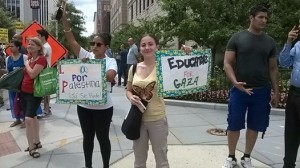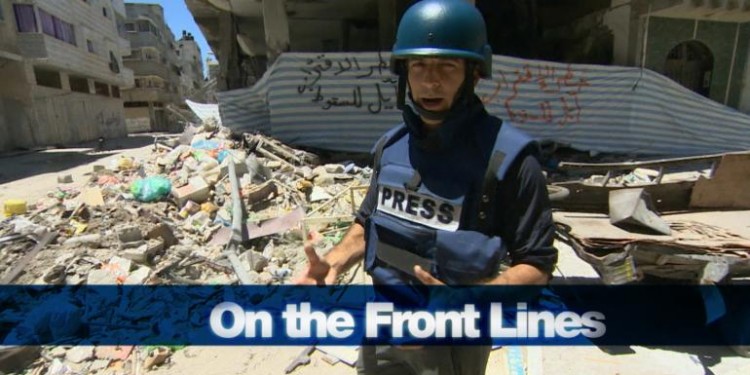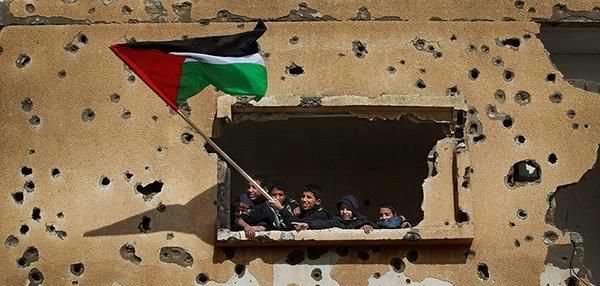Secondhand story of an occupation
Palestine is hard to talk about – its recent history frustratingly arduous to track with all the failed peace initiatives, ceasefires and UN resolutions. It seems to be stuck in an endless video loop. And many of us have watched this on screen our whole lives.
Smoke. Fire. Dead children.
Smoke. Fire. Children, rocks and tanks.
Fire. Rubble. Wailing mothers.
Smoke. Fire. Little boy face down on a beach and his legs … can legs do that?
Incandescent lives that mean something. Or don’t they?
I write this with the hope that no one in Palestine reads this. I hope that no one who has family in Palestine reads this. Please, may no one living near Palestine and who may have experienced Israeli aggression read this.
I write to reach others like me. Folks who have always had events framed for them. Because even having the horror confined inside the tube, or stretched across the ends of a dialectical pole has done something to us.
I grew up in the Middle East; not the dust, rubble and bombs sort of Middle East but the sort with sparkly high rises, pampered second class citizens, and the voiceless and invisible slave class that makes it all possible. I had no idea that my unanchored existence was the stuff of global citizenship. I never quite caught on to ideas such as having a homeland, or feeling a connection so deep with the ground you walked on that your identity was handed you with a platter of olives and figs. Where else would abstractions become touchstones but on the shifting sands of inhospitable deserts.
I remember cutting out pictures from newspapers and magazines that illustrated major events of the year to glue in my diary. Part of me believed putting glossy pictures next to spidery cursive gave me depth of character. Also, I actually cared. Pictures moved me. Many froze moments so immense that they had no business being two dimensional. Some pictures allow us to examine why we lose our voice. What is the nature of the fear that leaves our body feeling like a block of concrete. When the past and life and emotions are captured in a small, flat rectangle with nothing to console the dead present, one can’t help but stare.
Also, I actually cared. Pictures moved me. Many froze moments so immense that they had no business being two dimensional. Some pictures allow us to examine why we lose our voice. What is the nature of the fear that leaves our body feeling like a block of concrete. When the past and life and emotions are captured in a small, flat rectangle with nothing to console the dead present, one can’t help but stare.
As a young person I had only known the bubble wrapped existence of the well paid guest worker. My family mostly knew others like us, comfortable expatriates. Summers brought the exodus to lands of green and mosquitoes. And then back to boring schools and plastic toys. We do this over and over again till we become in-between people. This is just a polite way of saying that I don’t have a home base. I only find home in people. And people are often mercurial even when they are constant. I saw images of Gaza from my safe/scary vacuum sealed bubble so I could encounter what was real. The death of other children like me was terrifying but it was those who survived when their families died that left me cold. I knew my parents before I knew earth and sky. Wouldn’t the sky crumble if my dad died?
We hear ‘Palestine’ and something in the lower brain gets triggered.
As an adult I know why Palestine still has that effect on me. Indiscriminate killing of noncombatants, displaced masses, destruction of homes and cities – these are commonplace. Bombs, machetes, Caterpillar bulldozers, weaponized drones, guns, tanks, are fickle currency in the economy of death. But Palestine still cuts like a knife.
Perhaps because so many variations on the theme of blunt aggression converge upon the people of Palestine.
Perhaps its because unlike other conflicts that almost always involve failed states, Palestine’s aggressor is a card carrying member of the international community. Israel is a liberal democracy and subject to international law. It is a guest with its pinky in the air sitting at the table getting served high tea. Israel’s endless strutting on  the world stage, defending its genocidal agenda is commensurable to the singular moment when George Bush Jr. appeared at a press conference in Baghdad. Except there is no al-Zaidi to briefly break through the facade.
the world stage, defending its genocidal agenda is commensurable to the singular moment when George Bush Jr. appeared at a press conference in Baghdad. Except there is no al-Zaidi to briefly break through the facade.
Why do we allow leaders of nations to get hermetically sealed within layers of protocol and political posturing till they think they are untouchable.
We are taught to celebrate modernity because the stuff that happens in Gaza and the West Bank supposedly belongs to a time before human rights – a time before the end of colonialism, a time before when the powerless and the few were fair game. But 47 years of occupation have proven that the normalcy of brutal domination on the weak by the powerful is still a thing.
At a recent protest, a sign read Here we go never again.
47 years is a long time to live with irony. Israel’s aggression and its citizenry, schooled in fear and hate and turned into a sort of zombie hoard, has refashioned Israeli identity away from its evolution story. Exempting the few, amazingly brave Israelis who listen to and act on the voice of their conscience, Israeli identity has come unmoored from the luminous example of survival and moral courage that followed the unspeakable tragedy of the Holocaust. More and more, Israel’s actions appear as the legacy of the Kapos who aided the Nazis in the killing, torture and degradation of their own people.
One of the ways Muslims and other religious people respond to the brutality in Gaza and the West bank has been with statements that run something like this – The afterlife is a better place for the innocent victims. Israel may escape justice in this world but it can never escape Justice in the next world. All we can do is pray for Gaza.
I envy whatever modicum of consolation these sort of well-intentioned but ultimately defeatist sentiments bring. I  remember thinking along similar lines. More often than not, the belief in an omnipotent, creating agent enables us in many ways to continue obfuscating the responsibility we have toward each other. Yes, people of faith own up to the reality that we are indeed helpless and unable to change the past. But when faced with gross injustice we need to linger on the anger and bargaining stage of the grieving process. We will never affect change if we quickly slide into sadness and acceptance without recognizing and giving voice to our experiential panic that drives the instinct to ameliorate.
remember thinking along similar lines. More often than not, the belief in an omnipotent, creating agent enables us in many ways to continue obfuscating the responsibility we have toward each other. Yes, people of faith own up to the reality that we are indeed helpless and unable to change the past. But when faced with gross injustice we need to linger on the anger and bargaining stage of the grieving process. We will never affect change if we quickly slide into sadness and acceptance without recognizing and giving voice to our experiential panic that drives the instinct to ameliorate.
Accusing pro-Palestine activists of tribalism based on religion is the quickest (and might I add, most tribal) way that dissenting voices have been dismissed. I agree that religions make it easy to form manichean perspectives. Religious ideology, in creating the big, bad, other does not so much unify its adherents as much as it takes away their moral courage and good sense.
I extricated myself from this existential anxiety when I left Islam. I expect other former religionists to have done something similar. I do not expect them to simply switch “sides” and continue rationalizing a state of belligerence to target a new threat. Leaving a flawed ideology only to germinate another equally damaging one is self-defeating egotism. If you cannot break out of your political and ideological positions, your cultivated complacency or indifference, to stand up for the most basic (also criticized as the most reductive) of human rights, which is the right to life, then something has gone horribly wrong.
I write this because public opinion does matter in a conflict where the aggressor is a nation state that claims to be a liberal democracy and garners global support and recognition. Sometimes ordinary people can add their voice to build a flood of dissent and good will come from it. Opting out of the discourse because you don’t like the company you’d be keeping is immature and cowardly.
Surprisingly, the pro Palestinian position held by many who have left Islam has been questioned and cynically ascribed to a presumed anti-Semitism, a lingering after-effect from being Muslim, by other former Muslims. I get the impression that I could explain my motivations till Carl Sagan turns over in his grave but it wouldn’t make a jot of difference. I am familiar with this; I have family who have formed an intractable opinion of me that no amount of explaining will alter. There is nothing to be done when you have been written off as soulless, stubborn, corrupt, crooked. And so I must ignore insinuations that I am in some intrinsic way damaged or blindsided by my past.
One of the reasons Palestine has become increasingly significant to me is how criticism of Israel is not allowed. Israel and Judaism are not synonymous. To suspect anti Jewish sentiments to be at the core of any condemnation of Israeli action against Palestinians, Arab-Israelis or other ethnic minorities in Israel is quite  frankly becoming old. I spent most of my adult life under this gag order, plenty of time to analyse my own motivations and get informed on the subject. Its time to make it okay to speak out. Its time to stop passing on these invisible, implied restrictions on whose rights people can stand up for and who get systematically overlooked. Israel’s friends, too, are doing it no favors by withholding constructive criticism.
frankly becoming old. I spent most of my adult life under this gag order, plenty of time to analyse my own motivations and get informed on the subject. Its time to make it okay to speak out. Its time to stop passing on these invisible, implied restrictions on whose rights people can stand up for and who get systematically overlooked. Israel’s friends, too, are doing it no favors by withholding constructive criticism.
I am hopeful. A Middle East expert (the clever kind) wrote this – ” I wonder, though, if we’re not on the cusp of a third Intifada, characterised not by mass militancy as was the case in the second but by relatively non-violent protests and rioting? And I wonder if that might not be what is needed for Israelis to realise that the status quo is not sustainable?”
Waiting at a street corner near the White House before joining the pro Palestine protest, I was a bit alarmed to see several police cars blaring their way to where everyone was gathering. The groups who organized the event know their stuff so I knew that things couldn’t have gone violent. I get to where the action was to see a handful of pro Israel supporters behind a barrier being escorted into police vans for evacuation. A woman holding a large Israeli flag turned and waved at the crowd, blowing kisses like a beauty queen on a float. Something about her graceful exit, and the crowds singing “Na na na na hey-ey goodbye” was simply beautiful. The pro Israel group flashed victory signs while leaving in the protection of a law enforcing, neutral party while the masses cheered and hooted, happy to see them leave. I want that to play out again and again with no one getting hurt, until Palestine breaks free.


